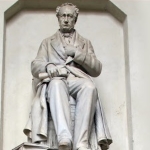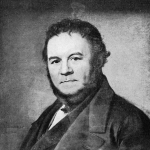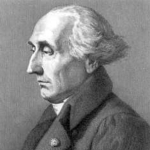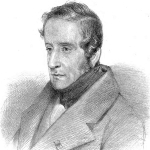Background
Giovanni Antonio Amedeo Plana was born on November 6, 1781, in Voghera, Italy. Plana was the son of Antonio Maria Plana and Giovanna Giacoboni.

1834
Plana was awarded the Copley Medal by the Royal Society for his studies on lunar motion.
1840
Plana was awarded the Gold Medal of the Royal Astronomical Society for "outstanding personal researches in the fields of astronomy and geophysics" as well as general contributions to astronomy and geophysics.
Giovanni Antonio Amedeo, Baron Plana. Lithograph. Museo Nazionale del Risorgimento Italiano di Torino.
École Polytechnique, Palaiseau, Paris, France
In 1800 Plana entered the École Polytechnique in Paris.
Turin, Italy
A monument dedicated to Giovanni Antonio Amedeo Plana.
Giovanni Antonio Amedeo Plana










Astronomer geodesist mathematician scientist
Giovanni Antonio Amedeo Plana was born on November 6, 1781, in Voghera, Italy. Plana was the son of Antonio Maria Plana and Giovanna Giacoboni.
In 1796 Plana’s father sent him to complete his studies in Grenoble, where two of his uncles lived. Plana soon became noted for his scientific ability; in 1800 he was admitted to the Ecole Polytechnique at Paris, where he remained for the next three years. This period was decisive in shaping his career, for one of his teachers was Lagrange. In Grenoble, Plana became a close friend of his famous contemporary Stendhal.
In 1803 Plana returned to Italy. Fourier, greatly impressed by Plana, had tried unsuccessfully to procure his nomination as a professor of mathematics at the artillery school of Grenoble but managed to obtain a similar post for him at the artillery school in Piedmont, which was then annexed to France; the school was located partly at Turin and partly at Alessandria. In 1811, on Lagrange's recommendation, Plana was named a professor of astronomy at the University of Turin. He remained there until his death, teaching astronomy, and infinitesimal analysis, as well as other subjects at the local military academy. For half a century he also directed and stimulated the development of the astronomical observatory of Turin.
His study of the moon was inspired by Barnaba Oriani, director of the Brera Observatory in Milan. Oriani had suggested that he and Francesco Carlini, who had done geodetic work with Plana, should attempt to compile reasonably precise lunar tables solely on the basis of the law of universal gravity - that is, using only the observational data essential to determine the arbitrary constants of the problem. Plana soon quarreled with Carlini, who withdrew in disgust; and Plana succeeded alone, after almost twenty years. The results were presented in the three-volume Theorie du mouvement de la lune (Turin, 1832). The work was not widely read and received criticism that was not always unfounded, but it is of notable scientific and philosophical value, and as such, it was well-received.

Plana is generally considered one of the major Italian scientists of his age because, at a time when the quality of instruction at Italian universities had greatly deteriorated, his teaching was of the highest quality, quite comparable with that of the grandes ecoles of Paris, at which he had studied.
Plana’s scientific contributions cover a wide range: mathematical analysis, such as Eulerian integrals, elliptical functions, and mathematical physics, such as the cooling of a sphere, electrostatic induction, geodesy (the extension of an arc of latitude from Austria to France), and astronomy, particularly the theory of lunar movement.
In 1827 Plana was named astronomer royal; in 1844 he became a hereditary baron; in 1848, a senator; and in 1860, associe etranger of the Paris Academy of Sciences.
In 1820 he was one of the winners of a prize awarded by the Académie des Sciences in Paris based on the construction of lunar tables using the law of gravity. In 1834 he was awarded the Copley Medal by the Royal Society for his studies on lunar motion.
In 1832 Plana was elected a Foreign Honorary Member of the American Academy of Arts and Sciences. In 1860 he became a member of the Paris Academy of Sciences.

In Grenoble Giovanni Plana became a close friend of Henri Beyle, the famous French author better known by his pseudonym Stendhal.

When in 1800 Plana entered the École Polytechnique in Paris. There he was greatly influenced by Lagrange who was one of his teachers.

1783 – 1862
